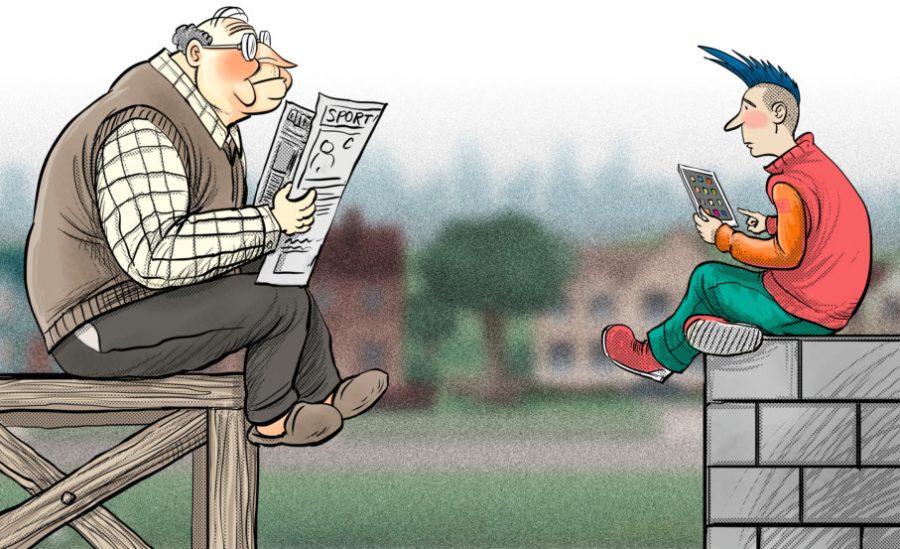Respect Your Elders…For What?
Digging into the phrase “respect your elders” and how harmful it really is.
https://www.theartof.com/articles/the-art-of-bridging-the-generation-gap-in-the-workplace
The age gap between generation can blur the lines of respect and disrespect.
“Respect your elders” is a phrase every kid has heard a least once in their life. And sometimes it’s being used in the right context, but most of the time it is not helpful. The phrase “respect your elders” is outdated and is an excuse adults use when a teenager says something they don’t like. онлайн займ на карту срочно без отказа
These three words imply that adults deserve our respect while we have to earn theirs. Elementary school age kids tend to take words very literally and can interpret the phrase as adults can do no wrong. If an adult acts disrespectful to a teenager it’s okay because they’re a mature adult who has been through life and “knows better.” But the minute a child defends themselves or proves an adult wrong it’s labeled as “talking back.”
Adults expect teenagers to act like adults, yet they continue to treat us as children. We are told that to be treated as an adult, we have to act like an adult. The problem with that is when we actually act like an adult, we are still treated like children.
We have to ask our teachers if we are allowed to go to the bathroom. We have to raise our hand to be “allowed” to talk. People don’t have to regularly raise their hand to talk in public.
Adults will treat teenagers as if they are an adult and say that it is “preparing us for the future” when really all it does is make teens feel like they are not good enough.
An alternative phrase to use would be “respect those who respect you.” I believe that everyone deserves respect until they have given someone a reason why they don’t deserve it. But if someone is blatantly disrespectful towards someone, you shouldn’t just sit there and take it.
Using the phrase “respect your elders” can imply that we, as teenagers, cannot stand up for ourselves against an adult. Additionally, this phrase is more demanding that we respect adults unconditionally. It encourages us to comply to adults and do whatever they say even if it is hurtful or wrong.
The phrase implies that before we may even truly know someone who is older than us, we are supposed to respect them because they’ve “earned it”. Somehow since they’ve made it further in their life thus far, they should automatically be respected by those that are younger than them.
Children are taught that they have to earn respect from their elders. It’s strange, for we are supposed to blindly respect someone who probably won’t respect us until we’ve proved ourselves to them. We have to earn their respect while we must automatically respect them, simply because they are older than us.
“Respect your elders” should be used in a different way. It should be used in a way where children don’t have to respect someone older than them, unless they know the person and the respect is mutual.
It is common for adults to make remarks that are disrespectful towards younger generations, which is somewhat hypocritical to what they preach. “I’ve had many family members tell me I don’t work hard for anything, and don’t have any struggles just because I am young.” says sophomore Claire Clemmer.
But when kids do bring up actual problems adults invalidate their problems and blame it on the internet. “I have been told that everything I complain about is caused by being on my phone.” says sophomore Ella Zimmer.
So, we have to earn respect from others around us, but, that should apply to everyone, not just children. Elders should have to earn our respect just as we’ve earned theirs.
Should we be nice to our elders, yes. Should our elders be nice to us, yes. But, it doesn’t mean we should earn each other’s respect right away. It takes time, and we should all accept that.

Jocelyn Smith is a freshman who takes the Intro to Journalism course at NAI. She enjoys playing soccer, running in track, and reading novels. Her favorite...



Ray Arnold • Nov 8, 2021 at 10:03 am
This claim is foolish. I will agree on how Adults will blame the internet for the problems, but then again that depends on what you are complaining about. Saying that adults need to earn the respect of teenagers is not true, adults are the authority, they are your parent/guardian saying they need to earn your respect is foolish. Now the reason people respect your elders is because they have been thru a lot. For example if your grandmother lived from 1945 to 2020 she would have lived thru the cold war, multiple recessions while having to raise a family that leads up to you. Now granted if your grandmother does satanic chants and leaves you to die then yeah I think not showing respect is reasonable. Speaking of which this is a very case by case situation, it really depends on what your parents do, but for the most part you should respect your elders, unless they do some unspeakable action.
Aaron • Mar 3, 2022 at 9:13 pm
Ms. Jocelyn Smith is right. Ray, you’re wrong. Although someone has lived longer and has experienced terrible things, in no way shape or form means they are deserving of respect. If you were an educator, you might understand that you can gain or lose your students’ respect with your actions. I am the authority in the classroom, but if I treat my students poorly, they won’t respect met.
Clive Morgan • May 8, 2022 at 4:38 am
Ray, I really disagree on your opninion. Jocelyn is correct. Nowadays in this generation we are in, we tend to have different perspectives on things. Respect is truly earned, not forced. We don’t have to respect someone because they have gone through a lot, we respect people because they are worthy of it no matter your age. Just because you have been on this planet more than others does not mean you are entitled have respect. “Respect your elders” in my opinion sounds so demanding, manipulative & intimidating.